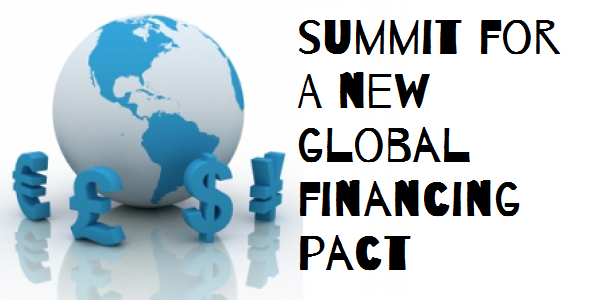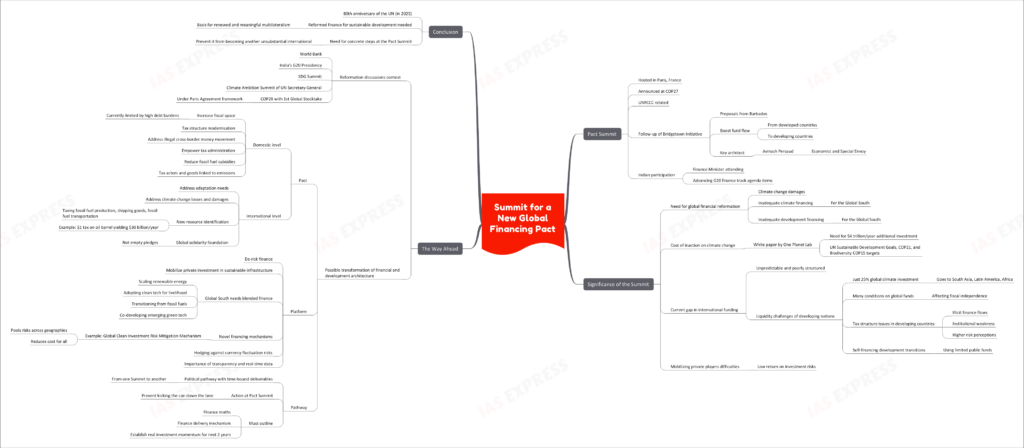Summit for a New Global Financing Pact- How Can it Deliver?

France is hosting the Pact Summit in Paris. This summit comes in the middle of a consequential year and also at a time when there are growing calls for global financial reformation.

About the Summit:
- The Pact Summit or the Summit for a New Global Financing Pact is an international gathering to develop a “new financial pact with the most vulnerable countries”.
- The Summit was announced at the COP27 (27th Conference of Parties) of the UNFCCC (UN Framework Convention on Climate Change).
- This Summit is a follow-up of the Bridgetown Initiative.
- It is a package of proposals put forth by Barbados.
- It is an effort to boost fund flow from the developed to developing countries for climate and development.
- Economist and Special Envoy Avinash Persaud is considered as a key architect behind this initiative.
- It is being hosted in Paris, France.
- The Indian Finance Minister is attending the Summit on India’s behalf. The Indian delegation is to advance its agenda items of the G20 finance track.
Why is it significant?
- The Summit is being perceived as a wake-up call for reformation of the global financial architecture. This is especially necessary given:
- The piling up of losses and damages due to climate change.
- The inadequate financing of the climate needs of the Global South.
- Inadequate financing of the Global South’s development needs.
- The cost of inaction to address climate change is becoming clearer by the day. According to a white paper by One Planet Lab, an additional investment of $4 trillion/ year is required to meet the UN Sustainable Development Goals, climate COP21 and Biodiversity COP15 targets.
- However, the current gap between promises and payment shows the unpredictable and poorly structured nature of international funding.
- The liquidity challenges of the developing nations remain unaddressed.
- Just 25% of the global climate investment goes to the most vulnerable regions- South Asia, Latin America and Africa.
- Also, global funds often come with several conditions, thus clamping down on these countries’ fiscal independence.
- In addition to this, the tax structure in the developing countries lead to- illicit finance flows, institutional weakness and higher risk perceptions.
- As a result, these countries continue to pay for their own development transitions using limited public funds.
- It is also difficult to mobilize private players to take the jump here, considering how the returns are not high enough to bear the real/ perceived risks of investing in these developing countries.
What is the way ahead?
- The Summit is taking place in the middle of a consequential year featuring discussions on the reformation of:
- World Bank
- India’s G20 Presidency
- SDG Summit
- Climate Ambition Summit of UN Secretary-General
- COP28 with the 1st Global Stocktake under the Paris Agreement framework
- In such a time, the Summit could serve as a critical forum for transforming the international financial and development architecture. For this, it must include 3 components:
- Pact
- Create a pact on the global flow of finances, covering 2 levels of social contract:
- Domestic
- At the domestic level, there is a need to increase the fiscal space of developing countries. It is currently limited by the high debt burdens.
- This calls for:
- Modernizing and standardizing the existing tax structure
- Addressing illegal cross-border money movement
- Empowering tax administration
- Reducing ineffectual fossil fuel subsidies
- Proportionate taxation of actors and goods linked to emission-intensive global flows
- International
- At the international level, there is a need to address the needs for adaptation and address the loss and damage due to climate change.
- The international social contract must be founded on a strong foundation of global solidarity, not on empty pledges.
- For new resources, countries can tap into global flows, like taxing fossil fuel production, shipping of goods and transportation of fossil fuels. Eg: taxing an oil barrel at just 1 dollar would translate into $30 billion/ year.
- Domestic
- This approach could help decouple financing the vulnerable from the political resistance of taxpayers in the richer countries.
- Create a pact on the global flow of finances, covering 2 levels of social contract:
- Platform
- Create a global platform to de-risk finance and mobilize private investment in sustainable infrastructure.
- The Global South needs blended finance for several heads:
- Scaling renewable energy
- Adopting clean technology for livelihood
- Transitioning away from fossil fuels
- Co-development of emerging green tech, etc.
- This calls for novel financing mechanisms like the Global Clean Investment Risk Mitigation Mechanism which pools risks across geographies and reduces the cost for all.
- Attention must also be paid to hedging against currency fluctuation risks which can potentially increase cost of finance.
- Transparency and real time data are also important.
- Pathway
- Create a political pathway with time-bound deliverables on climate finance from one Summit to another.
- Not everything can be achieved in just one Summit, but the Pact Summit must take action to prevent kicking the can down the lane.
- It must:
- Outline the maths of the finances
- Outline the mechanism of finance delivery
- Establish momentum for real investment for the next 2 years
- Pact
Conclusion:
Approaching the 80th anniversary of the UN (in 2025), reformed finance for sustainable development should form the basis for renewed and meaningful multilateralism. For this, the countries must take concrete steps at the Pact Summit and prevent it from ending up as just another international summit without substance.
Practice Question for Mains:
What is the significance of the Paris for the Summit for a New Global Financing Pact? Discuss. (250 words)
If you like this post, please share your feedback in the comments section below so that we will upload more posts like this.

